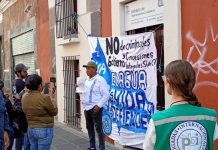Video still: The Colombian minister of the environment Irene Vélez Torres and the Dutch deputy prime minister Sophie Hermans announced at COP30 that an International Conference on the Just Transition Away from Fossil Fuels will be held in Santa Marta, Colombia on April 28-29, 2026.
The final “multirao” (from the Tupi-Guarani language meaning “collective effort”) text from the recent United Nations COP30 climate summit in Belem, Brazil makes no reference to environmental defenders.
At the conclusion of COP30, The Guardian also reported that the final text also makes “no mention of fossil fuels – the root cause of the climate crisis” and has “only one vague mention” of the rainforest.
The eight-page Global Multirao also only has a singular reference to “rights” which appears in the preamble paragraph that states:
“Acknowledging that climate change is a common concern of humankind and that Parties should, when taking action to address climate change, respect, promote and consider their respective obligations on human rights, the right to a clean, healthy and sustainable environment, the right to health, the rights of Indigenous Peoples, as well as their land rights and traditional knowledge, and of local communities, migrants, children, persons with disabilities and people in vulnerable situations and the right to development, as well as gender equality, empowerment of women and intergenerational equity.”
The Global Mutirão: Uniting humanity in a global mobilization against climate change declaration can be read in full here.
Environmental defenders sidelined
On Friday November 21, Ginger Cassady, the Executive Director of the Rainforest Action Network, commented: “In the closing days of the talks, attempts to dilute gender language, weaken rights protections and sideline environmental defenders have drawn strong backlash from civil society and many governments.”
AREAS TO FOLLOW
Along with these shortcomings, failures and entrenched power dynamics, there may be some new areas that could offer some hope.
1- Political Declaration on the Protection of Indigenous defenders
The Rainforest Action Network points with some optimism to the POLITICAL DECLARATION OF THE INDIGENOUS PEOPLES OF THE AMAZON BASIN AND ALL BIOMES OF BRAZIL FOR COP30.
This Declaration affirms six points including: “4. Protection of indigenous defenders. The safety of leaders and defenders who protect the forest must be an essential part of climate policies.”
2- Global initiative to increase protection of environmental human rights defenders
On November 13, Global Witness noted: “Campaigners are hailing today’s COP30 launch of a new global initiative aimed at advancing the recognition, protection, and participation of environmental defenders in climate decision and policy-making. Co-created with more than 300 environmental activists and defenders across Latin America, Africa, Asia-Pacific and beyond, the new Leaders Action Network for Environmental Activists and Defenders (LEAD) initiative is designed to centre the experience of people who bear the brunt of climate violence.”
Their announcement in the early days of COP30 further noted: “LEAD brings together governments, environmental human rights defenders, civil society leaders, UN agencies and institutions to coordinate transformative solutions to … increase their protection and reduce violence against them.”
3- Declaration on Information Integrity notes environmental journalists, defenders
Some hope can perhaps also be derived from Canada, Belgium, France, Germany, the Netherlands, Norway, Spain and other countries signing the “Declaration on Information Integrity on Climate Change” at COP30.
The Declaration, noting concern about “deliberate attacks on environmental journalists, defenders” calls on governments to “ensure the safety of environmental journalists, defenders…”
4- U.S. legislation against harms to environmental defenders
On November 21, U.S. Senator Ed Markey issued a press release headlined: As COP30 Comes to a Close, Sen. Markey, Rep. Escobar Announce Legislation to Hold Accountable Those Who Harm Our Climate and Environmental Defenders Abroad.
That press release highlights that if this legislation were passed, it would ensure that “existing human rights and corruption sanctions under the Global Magnitsky Act cover the corruption that leads to fueling the climate crisis, as well as human rights abuses committed against environmental defenders.”
5- Just Transition conference in Colomba, April 28-29, 2026
And on November 21, Colombia and the Netherlands also announced the Belém Declaration on the Just Transition Away from Fossil Fuels.
At least twenty-four states are backing this Declaration including Belgium, Kenya, Mexico, Nepal, the Netherlands and Spain.
The Fossil Fuel Treaty website reports:
“As COP30 negotiations draw to an end, and the most recent text released [on November 21] makes no mention of fossil fuels, the Governments of Colombia and the Netherlands show leadership by announcing they will co-host the First International Conference on the Just Transition Away from Fossil Fuels. The announcement was made by the Minister of Environment of Colombia, Irene Vélez Torres, and the Deputy Prime Minister and Minister for Climate Policy of the Netherlands, Sophie Hermans, during a high-level press conference in Belém.”
That update adds: “The landmark convening will take place on 28-29 April 2026, in the port city of Santa Marta, Colombia, which plays a significant role in coal exports.”
On November 22, The Guardian also reported as an outcome of COP30: “A commitment to a roadmap to transition away from fossil fuels was not part of the formal deal in Belém, but Brazil backed an initiative outside the UN process, building on plan backed by Colombia and about 90 other nations.”
PBI-Canada will follow this initiative and other efforts that could contribute to the protection of environmental defenders.
Further reading: PBI-Canada hosts webinar on COP30 with Indigenous West Papuan land and environmental defenders, Global Witness policy advisor in Brazil (PBI-Canada article, November 20, 2025).






